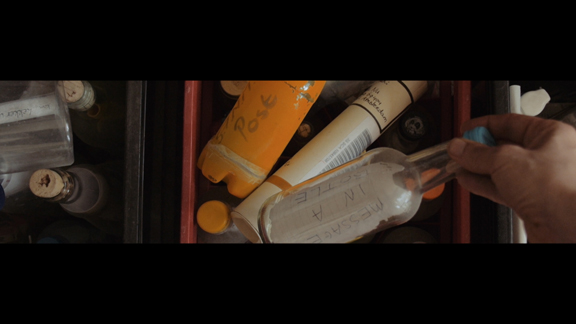In collaboration with the Center for Visual Culture, Special Collections welcomes artist Ellie Ga to campus virtually (during the current school year) and in person with a residency (as soon as that is possible). While in residence, Ga will “comb” Special Collections in the process of producing a new work of art, commissioned for the College. Before then, she wants to connect with us by sharing her work and conversing with community members as she gets to know Bryn Mawr.
The first virtual event is a screening at 12:30pm on March 10 of her piece, Strophe, A Turning (2017, 37 min.), with a virtual studio visit and conversation between the artist and Bryn Mawr faculty members Lisa Saltzman (History of Art) and Madhavi Kale (History).
Please visit our related website to learn more about all Ellie Ga related events and activities at Bryn Mawr College as they are scheduled.
Please also view Sayed, a work by Ellie Ga, made available by the artist and her gallery through the Center for Visual Culture’s Virtual VIsual Culture event series.
***
Ellie Ga (b. 1976) is an American artist living in Sweden. Her work is included in collections at the Solomon R. Guggenheim Museum, Whitney Museum of American Art, and Bard College. Her most recent work, Gyres 1-3 (2019), was a commission for the Whitney Biennial and was reviewed in The New York Times and Artnews. Art historian Tom McDonough (SUNY-Binghamton) wrote about it for the fall 2019 issue of Osmos Magazine.
Ga works between memoir, travelogue, and visual essay connecting ideas and presenting them as multichannel videos or performances with live narration. Her recent film Stophe, A Turning (2017) looks at water as the site of political exile, religious pilgrimage, and forced migration across the Aegean Sea. Her working process is a kind of “beach-combing” that embraces chance encounter with artifacts and how they find their way to her. It involves extended periods of research, including conversations with people in roles, such as museum directors, scholars, or Arctic explorers. Her interests are interdisciplinary and cross-temporal. She speaks of her work as a collection of chance encounters, what is lost (and accrued) in translating between spoken and written words, and archaeological discovery.
Ga will be in residence at Bryn Mawr College twice during the 2021-22 academic year and virtually throughout the 2020-21 school year. Throughout this process, we hope you will join us in a collective note-keeping practice, responding to your own experience of Ga’s work and the chance encounters you collect along the way.

